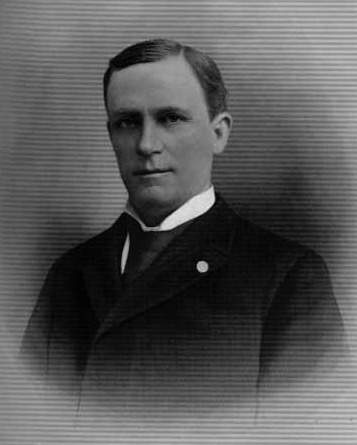Lyman Underwood Humphrey
Lyman Underwood Humphrey was born on July 25, 1844, in New Baltimore, Ohio, to Lyman Humphrey and Elizabeth Everhart. His father, a lawyer, died in 1853. Humphrey grew up and attended school in Marlboro, Ohio. He left school when the Civil War broke out, and he enlisted in the Union army on October 7, 1861. He mustered in as a private in Company I of the 76th Ohio Infantry on December 15.
Humphrey took part in the Battle of Fort Donelson, the Battle of Shiloh, the siege of Corinth, the siege of Vicksburg, the Atlanta campaign, the March to the Sea, and the Carolinas campaign. He was wounded in the Battle of Ringgold Gap on November 27, 1863, but he quickly recovered and rejoined his regiment. He was promoted to 2nd lieutenant on May 25, 1864, and then to 1st lieutenant on January 6, 1865. In October 1864, he declared that the “peace sneaks of the north should know by this time that their damnable cause must go down to nothingness and their names be forever damned to eternal infamy. I want the union men at home to be terribly in earnest…at the comeing election.” He mustered out in Louisville, Kentucky, on July 19, 1865.
Humphrey continued his education after leaving the army, attending Mount Union College and the University of Michigan. He was admitted to the Ohio bar in 1868. He moved to Shelby County, Missouri, soon afterward, and he worked as a teacher and newspaper editor there.
Around 1871, he settled in Independence, Kansas, where he practiced law and established the South Kansas Tribune. He helped found the Commercial Bank of Independence and eventually became the bank’s president. He married Martha Leonard on December 25, 1872, and they had four children: John, born around 1874; Lyman, born around 1876; Abraham Lincoln, born around 1878; and Edward, born around 1880. John and Edward both died in infancy.
Humphrey supported the Republican Party, and he won a seat in the Kansas legislature in 1876. He served as Kansas’s lieutenant governor from 1877 until 1881, and he was elected to the state senate in 1884. The state’s voters elected him governor in 1888, and he secured a second term two years later. He resumed his legal practice after leaving office, and he died in Independence on September 12, 1915.
Image: Lyman Underwood Humphrey (courtesy Wikicommons)
DATABASE CONTENT
| (1231) | Humphrey, Lyman Underwood | 1844-07-25 | 1915-09-12 |
- Conflict Side: Union
- Role: Soldier
- Rank in: Private
- Rank out: 1st Lieutenant
- Rank highest: 1st Lieutenant
- Gender: Male
- Race: White
Documents - Records: 1
- (2816) [writer] ~ Lyman U. Humphrey to Elizabeth Humphrey, 21 October 1864
People - Records: 1
- (1232) Humphrey, Elizabeth is the [parent of] (1231) Humphrey, Lyman Underwood
Places - Records: 2
Regiments - Records: 1
- (415) [officer] ~ 76th Ohio Infantry
Groups - Records: 1
- (3) [politician] ~ Republican Party
SOURCES
“Lyman U. Humphrey,” Wikipedia Profile, available from Wikipedia.org; 1850, 1880, 1900, and 1910 United States Federal Censuses, available from Ancestry.com; Civil War Soldier Records and Profiles, 1861-1865, available from Ancestry.com; The Atchison Daily Globe, 13 September 1915; Lyman U. Humphrey to Elizabeth Humphrey, 21 October 1864, DL0558, Nau Collection





